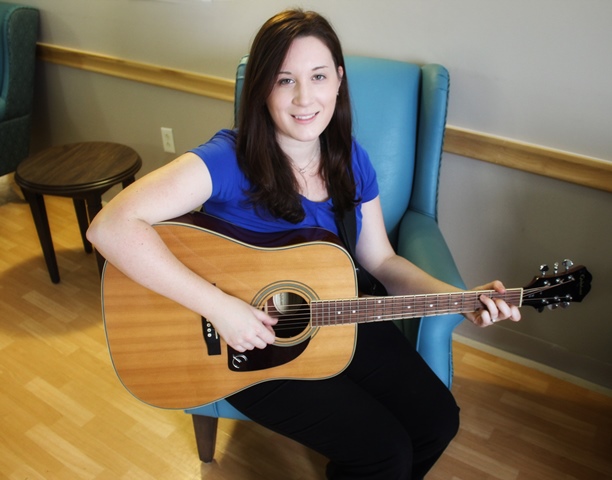By Rebecca Ihilchik
Meet Sarah Condran, music therapist at Arborstone Enhanced Care (Shannex) in Halifax, Nova Scotia. As a point-of-care clinician working with sound every day, she sees firsthand that noise can affect the mental health of older adults, especially those living with dementia.
Building on an initial sound audit pilot at Arborstone in 2017, Sarah is spearheading a CABHI-supported project to enhance sound environments in long-term care at her facility and beyond. She joined us for a Q&A about her project.
How does noise impact those living in long-term care settings?
In long-term care, sources of noise can include everyday things such as laundry carts, staff conversations, elevators, dishes, and the like. When our bodies are subject to loud or abrupt sounds, our body enters into a state of stress. Stress has many adverse effects on the body and can affect our bodies’ ability to heal and generally be well.
For those who already have cognitive impairments, once their attention is interrupted, it is difficult to get back. This can prevent nursing staff from completing seemingly simple procedures, create agitation, and reduce residents’ ability to effectively engage in leisure activities and therapeutic sessions. When environmental triggers such as noise are regulated, there is an incredible value to cognitive clarity.
What does your CABHI-supported project aim to achieve?
Through our CABHI project, we hope to enhance the sound environments in long-term care communities and create realistic guidelines and suggestions that other facilities will be able to follow. We will build on an initial sound audit pilot project to assess noise levels in our facility, as well as make physical changes to the living spaces and provide additional training to increase awareness of mental health and the impact that environmental stressors can have.
What are some examples of practical changes that could be made as a result of the project?
- Changes to physical environment, such as creating quiet spaces for therapy, recreation, family visits and quiet leisure to occur, as well as repairing and replacing regularly used equipment as necessary.
- Offer and enhance our mental health education for staff that is specific to seniors
- Changes in practice as needed—for example, how can we enhance our residents’ ability to communicate with staff and each other during meal times?
- Enhance leisure spaces and resources, by renovating recreation spaces so they are welcoming, or providing engaging leisure resources interesting for residents as well as families, volunteers, and staff.
What’s your experience been as a point-of-care worker involved with a project like this?
Because the team knows I am working on this project, they are coming to me with examples of how noise has affected either a resident or themselves. I am seeing that noise also can cause stress for staff. Being a part of the clinical team and having the experience on the floor means I am able to bring a different but important point of view to a project like this.
Rebecca Ihilchik is the Marketing & Communications Specialist at the Centre for Aging + Brain Health Innovation (CABHI).




